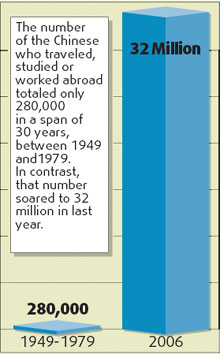More than 30 million Chinese travel overseas or go abroad to study or earn
their living every year. Many of them find themselves in various crises, from
everyday problems like losing a passport or being involved in an accident to
natural and man-made disasters such as a tsunami and wars.
Who should they turn for help? The Chinese embassies and consulates are
duty-bound to protect their basic internationally recognized rights. The past
year was especially unforgettable because more Chinese abroad became victims of
attacks, robberies, bomb explosions, kidnappings, fishery disputes, traffic
accidents and natural disasters.
|

Chinese tourist Zhang Yuexue (center) arrives at Xiamen airport
together with 243 overseas Chinese evacuated from East Timor in two
chartered planes by the Chinese government on May 29, 2006. Chen
Lijie |
The year also saw unprecedented government efforts to help such people. For
instance, the government arranged for special chartered planes and consular
staff evacuated about 900 people from violence-hit countries such as the Solomon
Islands, East Timor, Lebanon and Tonga. It conducted successful rescues and
offered regular consular services to ensure the safety of its citizens abroad.
Official figures show that the government handled more than 30,000 consular
cases last year to protect the legitimate rights and interests of Chinese
nationals overseas. The figure was 29,000 in 2005.
In the past two months, 14 Chinese workers kidnapped in Nigeria returned home
safe and sound, thanks to the tremendous efforts of Chinese diplomats. These
efforts have added a new chapter to the history of China's diplomacy.
Director of the Department of Consular Affairs of the Foreign Ministry Wei
Wei says Chinese consulate staff around the world are performing a much heavier
duty because more Chinese travel and live abroad today.
Only 280,000 Chinese travelled or went to study or work abroad between 1949
and 1979, that is, in 30 years. In contrast, their number last year alone was 32
million. What's more, the country is fast becoming the largest source of
tourists in Asia.
The international political, economic and security situation is becoming more
complicated and erratic, Wei says. "Serving the people is the essence of China's
diplomacy," and Chinese embassies and consulate-generals have been instructed to
go all out to help Chinese citizens in accordance with international laws.
To maintain the existing system of consular protection, the Foreign Ministry
set up the Division of Consular Protection, under the Department of Consular
Affairs, in May that would handle and coordinate consular protection work. It's
the biggest department in the foreign ministry and has 140 staff based in
Beijing alone, with more than 600 consular officials working overseas.
Last year, the Foreign Ministry issued about 400 special
notices on outbound traveling on its website, www.fmprc.gov.cn, up almost 50
percent over of 2005. The latest version of the regulation on "Consular
Protection and Services Overseas" is expected to be made public next month. 
Li Wei, a security expert with China Institutes of Contemporary International
Relations, says consular protection is a far more formidable job today , with
people's need for consular protection growing constantly. In fact, consular
protection is becoming a big challenge for every country, especially the bigger
ones.
An estimated 100 million Chinese will travel overseas in 2020 for business,
tourism, education or employment as more domestic enterprises strengthen their
presence abroad. And the government will do its best to protect its citizens
abroad, Li Wei says.
But he advises Chinese people, too, to learn to better protect themselves. He
suggests Chinese citizens learn the local laws, customs and abide by them during
their trips or stays abroad. They should remember certain important phone
numbers, such as those of the Chinese embassy or consulate in the country of
their stay. And to ensure a safe and sound trip, Chinese travelers should behave
properly.
He said he hopes Chinese wishing to work abroad would be more cautious and
verify the information with the domestic labor authorities and Chinese
diplomatic mission to avoid disputes.
Li Wei says some Chinese companies had not taken the security cost into
account while investing abroad. "They neither evaluated the security risks
properly nor educated their employees," Li says, "thus few companies had any
emergency plan to deal with a possible crisis."
(China Daily 03/07/2007 page8)
